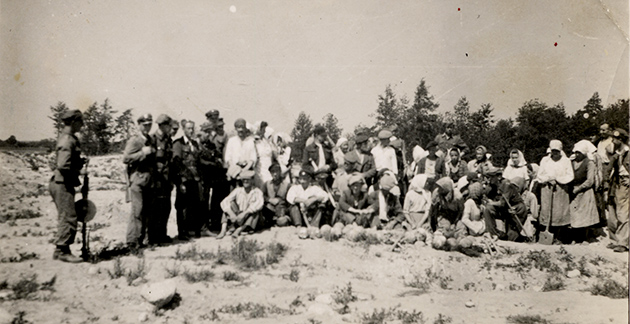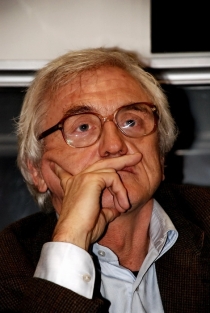The grainy and seemingly innocuous photograph on the cover of Jan Tomasz Gross’ disturbing book, Golden Harvest, published by Oxford University Press, shows a group of Polish peasants standing together in a group. One of them, a woman, holds a shovel.

The photograph in question, which first appeared in Poland’s largest newspaper, Gazeta Wyborcza, on Jan. 8, 2008, piqued Gross’ interest and inspired him to write Golden Harvest.
The Poles in the picture are standing on a mountain of ashes, culled from Jews gassed and cremated in the Treblinka extermination camp from July 1942 to October 1943. By all accounts, 800,000 Jews were murdered there.
The Poles are in Treblinka to dig and sift through ashes and remains, hoping to uncover valuables like jewelry and dental gold overlooked by the Nazis. After World War II, these “gleaners” or “diggers” converged on the sites of Nazi camps like Treblinka and Auschwitz. Occasionally, they would be chased away by the police.
These digs went on for decades and symbolized the plunder of Jewish wealth during and after the Holocaust, says Gross, a Polish-born Princeton University professor of history. In Golden Harvest, he and his wife, Irena Grudzinska, elaborate on this theme.
But as they point out, the inhabitants of the town of Treblinka did not draw their income exclusively from dead Jews. As the trains filled with doomed Jews pulled into the Treblinka train station, people from the general area would sell them food and water at very profitable prices.
Beyond ripping off Jews, these primitive but wily entrepreneurs sold food, alcohol and sex to camp guards, “revolutionizing the local economy,” they observe.
As they add, the mass murder of Polish Jewry materially benefited Poles who took over Jewish properties. Some were quite brazen about it. As they put it, “In her memoirs, a prosperous miller’s wife from Radzilow, Chaja Fineklszajn, describes a scene at the same moment as the mass killing of Jews was unfolding in her native village on July 7, 1941. Someone approached her with a suggestion that she turn over what she owned, since she would certainly be killed together with her family.”

Still other Poles turned up after Jews had been “resettled,” intent on grabbing what they could.
It gets worse.
“It appears that the killing of Jews by peasants in the Kielce countryside was socially sanctioned in multiple ways,” they write. “Regular members of the community took part in them, not miscreants or `marginal`people … Indeed the local elite`s participation bestowed upon these crimes a kind of official imprimatur.”
In still other cases, they say, peasants joined “hunts for Jews” with the prospect of receiving a few pounds of sugar, some vodka, or, most often, their victims’ clothing.
The Polish underground press would at times carry stories about the atrocious behavior of people who took advantage of this terrible situation.
Jewish survivors who returned to their homes to reclaim property were often met with a hostility tinged by antisemitism, they write. And Poles who had helped Jews during the Nazi occupation preferred not to speak about it, fearing their neighbors’ reaction.
Golden Harvest reminds us yet again that human beings can sink to abysmal levels.